Saturday, November 16, 2024 07:50 PM
Sustainability Challenges in Pakistan Organizations Require Urgent Training
- Only 6% of employees feel fully equipped for sustainability.
- Business leaders report a significant skills gap in sustainability.
- One-third of employees doubt their organization's sustainability capabilities.
 Image Credits: prnewswire_apac
Image Credits: prnewswire_apacA report reveals significant gaps in sustainability training and employee confidence in Pakistan's organizations.
In recent years, the concept of sustainability has gained significant traction among organizations worldwide. However, the implementation of sustainability initiatives remains a work-in-progress, particularly in Pakistan. A recent report by NTUC LearningHub highlights the challenges faced by both employees and business leaders in understanding and executing sustainability practices in the workplace.
According to the report, employees feel somewhat equipped to handle sustainability initiatives, with only 6% stating they possess the necessary knowledge and skills to a large extent. The majority, 55%, feel moderately prepared, while 34% believe they are only slightly prepared. This perception starkly contrasts with the views of business leaders, where over 80% acknowledge a significant gap in expertise and skill sets related to sustainability within their organizations.
Business leaders have identified several key areas where skills are lacking, including climate change sustainability (30%), environmental management systems (29%), and risk management (29%). These findings stem from a survey involving over 150 business leaders and 350 full-time professionals, emphasizing the urgent need for training and certifications in sustainability.
Despite nearly one-third of business leaders reporting that they have sent employees for sustainability training in the past year, only 11% of employees have actually attended such training. Alarmingly, about 46% of employees are unaware of available training programs. This disconnect raises questions about the effectiveness of communication within organizations regarding sustainability initiatives.
Both business leaders and employees share concerns about the barriers to training. Business leaders cite challenges such as employees being too busy with work (43%), difficulty in identifying recognized courses (39%), and insufficient budgets for training programs (36%). On the other hand, employees express similar frustrations, including being too busy (43%) and a lack of funding for training (29%).
Interestingly, while nearly four in five business leaders believe their organizations have clearly communicated sustainability goals, employees feel differently. The top motivators for sustainability initiatives also differ between the two groups. Employees prioritize cost savings (46%) and compliance with regulations (44%), while business leaders focus on responding to market demand (54%) and managing risks (43%).
Moreover, one-third of employees lack confidence in their organization’s ability to implement sustainability initiatives effectively. They cite unclear goals (41%) and insufficient budgets (34%) as primary reasons for their skepticism. This lack of confidence underscores the need for transparent communication and a clear sustainability roadmap within organizations.
Mr. Tay Ee Learn, Chief Sector Skills Officer at NTUC LearningHub, emphasizes the importance of aligning business leaders and employees on sustainability goals. He states, "Transparent communication is key, but organizations must first develop a clear sustainability roadmap with defined goals to ensure everyone is aligned." This alignment is crucial for fostering a culture of sustainability within organizations.
While the journey towards sustainability in organizations is fraught with challenges, it is essential for both business leaders and employees to work together. By prioritizing training and development, organizations can empower their workforce, ensuring that everyone is equipped to contribute to sustainability goals. As the world continues to evolve, embracing sustainability not only enhances business resilience but also fosters a more sustainable future for all.













